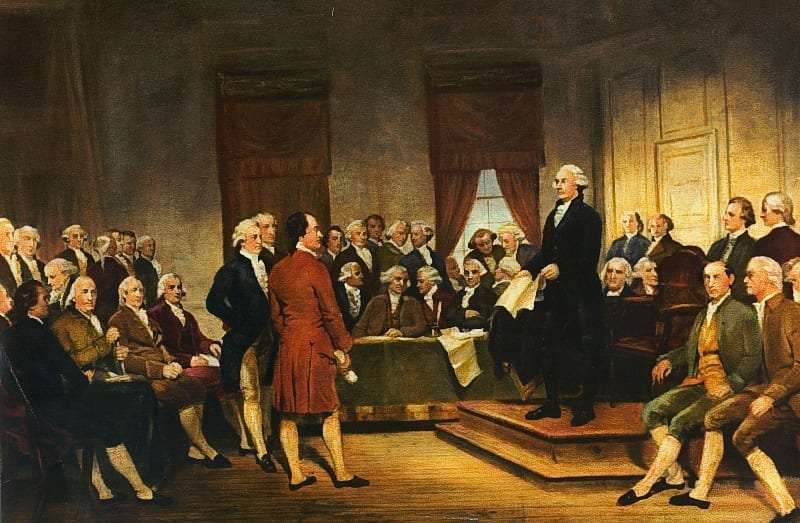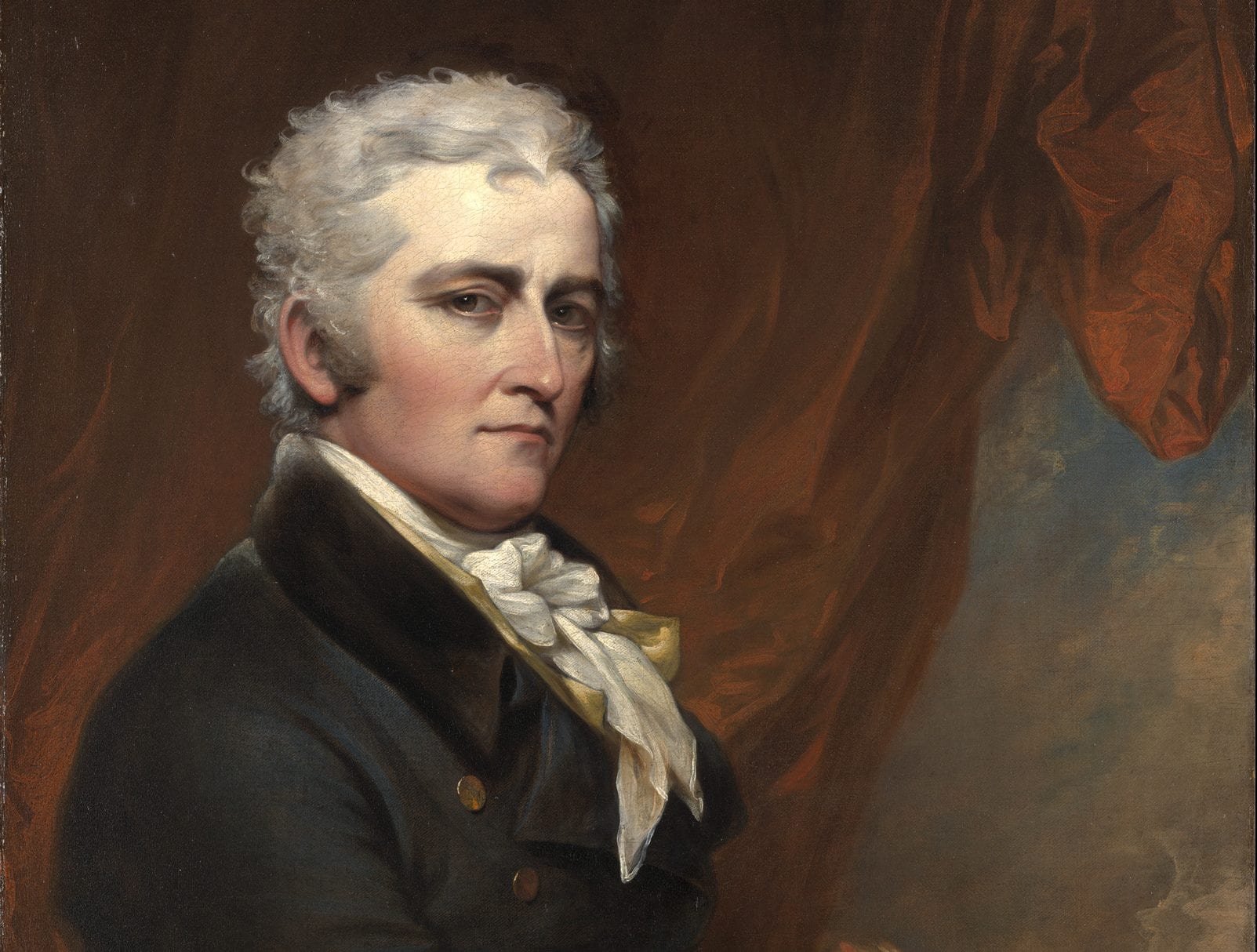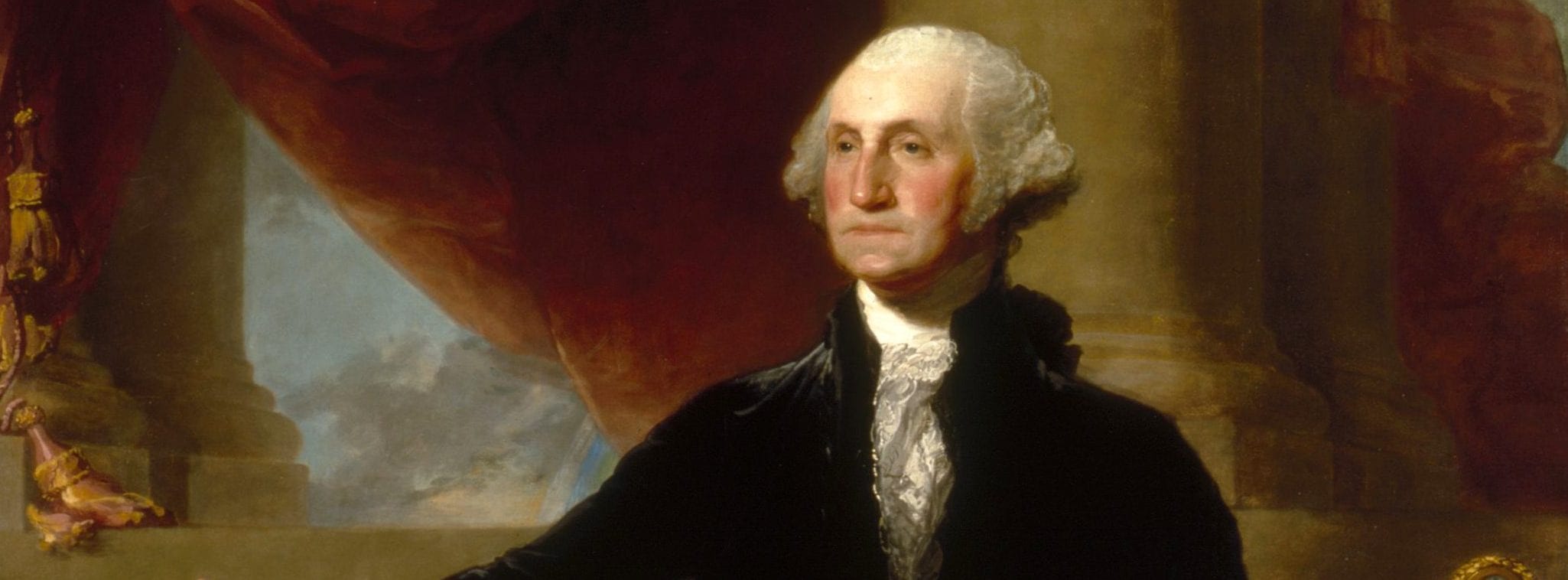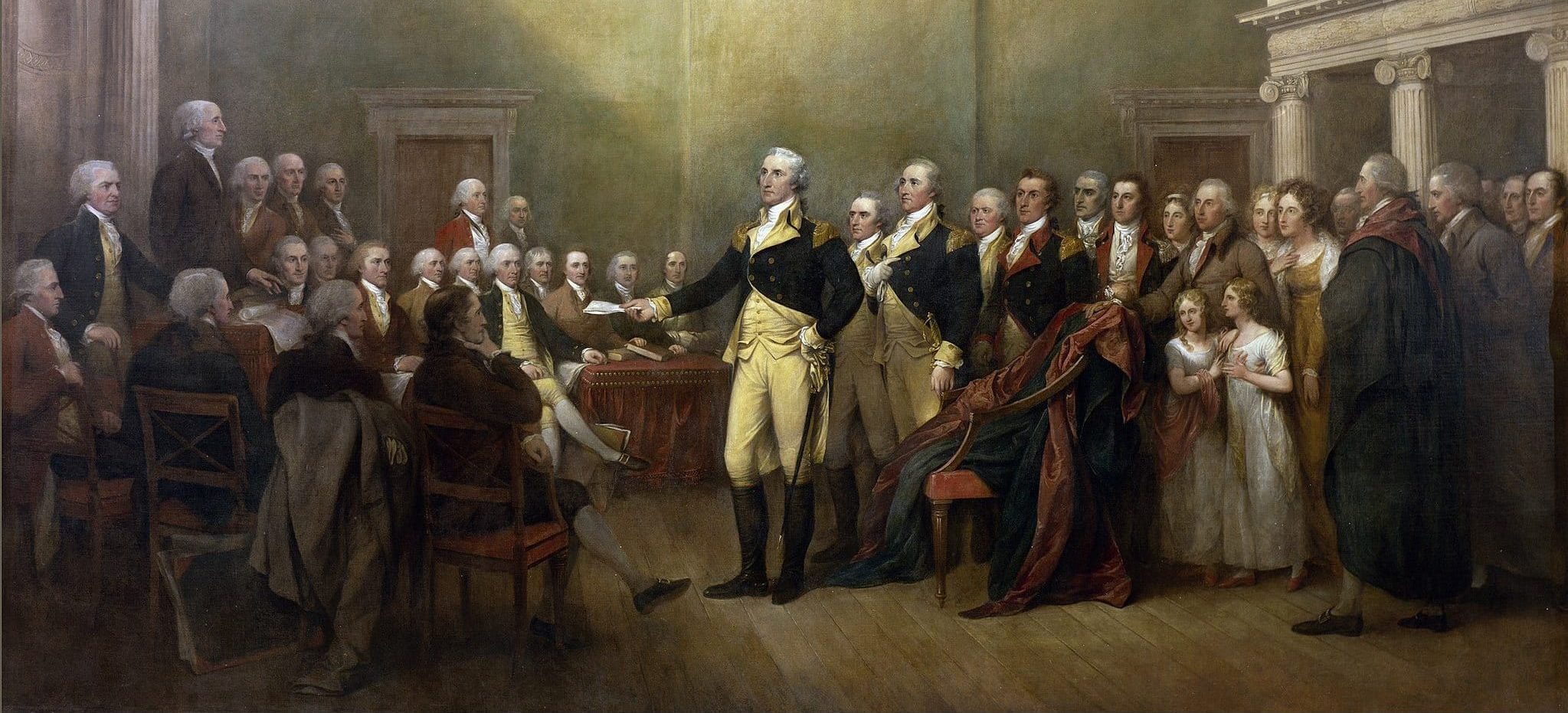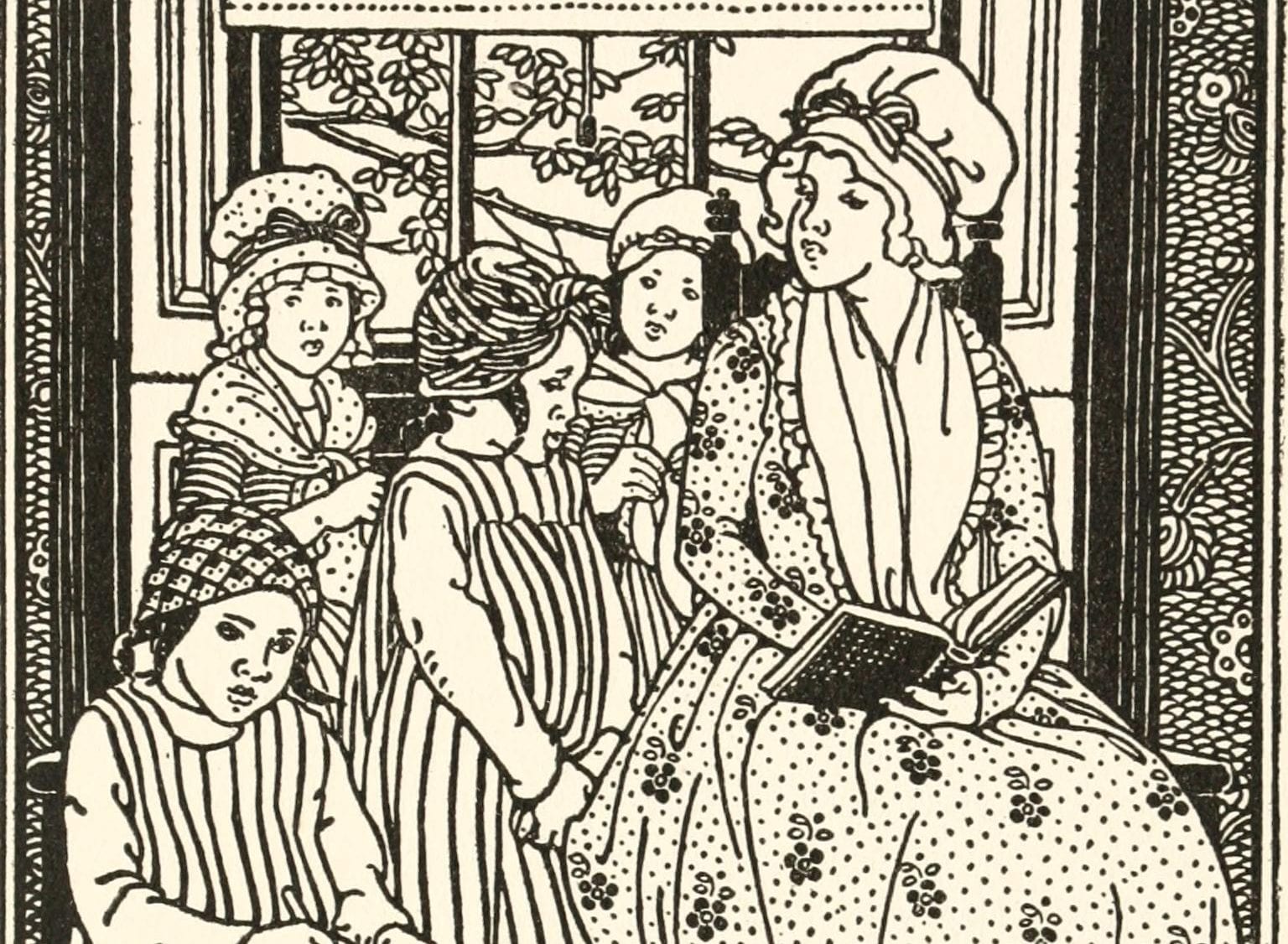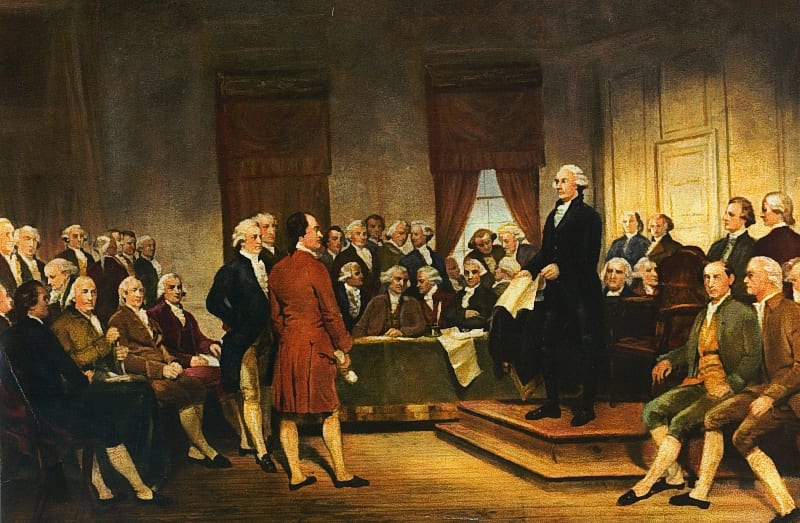
No study questions
No related resources
FRIENDS and FELLOW-COUNTRYMEN; When any nation is about to make a change in its political character, it highly behoves it to summon the experience of ages that have past, to collect the wisdom of the present day, and ascertain clearly those just principles of equal government, that are adapted to secure inviolably the lives, the liberties, and the property of the people. In such a situation are these United States at the present moment.—They are now called to announce the Alpha or the Omega of their political existence, to lay a deep foundation for their national character, and to leave a legacy of happiness or misery to their children’s children.—The Constitution recommended to the consideration of the United States, is a subject of general discussion; and, while it involves in its fate the interest of so extensive a country, every sentiment that can be offered upon it, deserves its proportion of the public attention.—It is worth our while, before we make any observations on the Constitution, as it stands recommended, to recur to the motives which gave rise to the calling of a Convention. We were taught by sad experience, the defect of the present articles of confederation, and wisely determined to alter and amend them.
At the framing of the present confederation, the bond of union among the States, which arose from a community of danger, in some measure superseded the necessity of wisdom. A common interest excited us to unite our exertions for the public good.
At such a time a system of government conceived in perfect wisdom, and adopted with deliberation, was not expected; and as soon as those common principles which supplied its defects, ceased to operate, the inconveniences which arose from them, were very sensibly felt. Since that time the seeds of civil dissention have been gradually ripening, and political confusion hath pervaded the States. Commerce bath been declining, our credit suffering, and our respectability, as a nation, hath almost vanished. In such circumstances it was thought proper to collect the patriotic wisdom of the States for the purpose of amending the articles of confederation, which were found to be inadequate to the security of national prosperity and happiness; and of making such additions to supreme power, as our situation testified, were wanted. Necessity, therefore, gave birth to the Convention, and the glaring defects of the late system of confederation, were the objects of its amendment. But was it a total subversion of the confederation, that was intended by Congress or expected by the people? Any one tolerably acquainted with human nature, can easily discern, that people involved in difficulty, would embrace any change, even if it were evidently and designedly for the worse. But this circumstance ought not to preclude examination. Did we experience any disadvantage from every part of the present confederation? And why alter that which experience itself hath taught us to be good? Was it not expected that some necessary additions to the powers of Congress, together with a few alterations of a smaller nature would constitute the whole of their business? To frame a Constitution entirely new therefore was out of their province. This is not offered as an argument against the Constitution itself, but it would certainly have been wisdom to have reserved that which was known to be good, and to have amended that only which was found defective from experience. But notwithstanding that, if the proposed constitution can be made [to] appear to be excellent in itself, and properly adapted to secure inviolably the rights and privileges of the people; it is the part of every honest man to wish its establishment.
But that upon examination it will be found to be otherwise, I am fully persuaded.We shall proceed to offer some sentiments on the Constitution proposed for the acceptance of the United States. In doing this, we shall endeavour to state most of the objections which have been made, and collect their force into one point of view.
It may be proper to take some notice(a)of an opinion that has been offered to the public. It is said by some, that after having delegated the best and wisest men in our country for the purpose of framing a Constitution for the United States, it would be only presumption to offer any objections to it. This doctrine holds up to view an excess of humility. Any errors which we may imagine to exist in the Constitution, we are to resolve into our own incapacity to fathom them. It is true that we ought to rely much upon the wisdom of those patriots who composed the late Convention; but surely the people for whom they acted have an undoubted right to offer such objections as they may suppose to exist, and that for the purpose of having them accurately solved by more enlightened understandings. It is the part of the doubtful to enquire, and of the wise to answer and instruct. It is from this principle, and this only, that I now offer my thoughts on the subject. Besides the nature and importance of the thing shew the propriety of impartial discussion.
If it be true also, that no public deliberative assembly, however wise, is perfectly uninfluenced by secular interest; but that all are in some degree subject to those temporary relapses from prudence, which passion occasions, we may very naturally suppose that some parts of this Constitution are tinctured with correspondent partiality and weakness. Nature is seldom over-awed by wisdom, and she often times draws her own picture in opposition to the constraint of education. We may with-out derogating from the characters of the members of Convention, expect to find defects in the Constitution which they have framed; and if the scrutiny of the public eye, viewing it in an infinite variety of lights can discern them, the motives must be dishonorable that prevent the communication of them.
On this subject much bath been published. Most of those pieces, however, which are said to be in favour of the Constitution, are only penegyrics, or those (b)parts which are good, and to which no objections have been made. Mr. Wilson’s speech does not come under this description. It was composed in a masterly manner with strength and judgment. In it he has endeavoured to obviate some objections that have been offered to the public. It may be that the force of his arguments is not fully felt; but I think it will appear to any one whose understanding is not immediately (c)refined, that the writer who stiles himself the Democratic Federalist is more than equal to him. The Centinel has ably proposed many objections which have not been yet satisfactorily refuted. Probably some of them exist beyond contradiction. The author of a pamphlet, stiled, Remarks on the Address of the Sixteen Members of the Assembly of Pennsylvania, has indeed touched upon many objections, and then dismissed them. His whole performance is coloured with the ridiculous. He is no doubt a friend to Shaftsbury’s position, and feels that it is easier to laugh than to reason. There is another pamphlet written by a citizen of America in favour of the Constitution. The author of this deserves much for his style and plausibility of expression. He has made many excellent and wise remarks upon the Constitution. He has instituted a comparison between it and that of Rome and England. He points out several defects in the system of policy amongst the old Romans and modern Britons, and shews with some judgment the superior excellence of the proposed Constitution in its correspondent parts. But this is by no means proving that there are no errors in it. Some objections he has indeed partially considered, but the chief of the piece, which is good in itself, consists in encomiums on those parts which are unexceptionable. His mode of comparison is not just. Wealth and extent of territory have an immediate relation to government. The manners and customs of the people are closely connected with their government. Experience testifies that the manners and habits of the people in their several graduations to refinement have ever controlled their policy.
The excellent Montesquieu himself observes, that “the manners and customs of the people have an intimate connection with their laws.” In a comparison therefore, all these things ought to be considered. The same system of policy that might have been excellent in the government(d)of antiquity, would not probably do at the present day. The question which should be agitated is not whether the proposed constitution be better or worse than those that have from time to time existed; but whether it be in every respect adapted to secure our liberty and happiness at the present stage of the world.
There is one circumstance in the sitting of the late Convention, which bears upon its face the colour of suspicion. It adds one to the many examples of the truth of the common adage (which is founded in a propensity of human nature) that all who have power are fond of executing(e)it. They have(f)power to control the manner of their convening, and they did it indeed in a very suspicious way. They excluded them-selves as it were from the view of the public, and an injunction of secrecy was imposed on the members. This might have been done to blunt the natural jealousy of the people; but it was depriving them of a guard to their liberties, which they should ever possess. Whatever were there intentions in shutting out their proceedings from the public ear, it carried in it a suspicious appearance.
But this is a matter small in itself, and for the honor and respect which we profess to entertain for the members of Convention, we are bound to believe that their motives in this particular were honorable, decent and wise.
In reviewing the proposed Constitution, the first thing that strikes us is the division of the legislative authority into two branches. I think that after mature deliberation, this will be acknowledged to be prudent and wise. Yet what some writers have observed upon it is not perfectly true. They have deduced their advantages from improper positions. In the division of the legislative power, bad bills will probably be passed, but more good ones will be opposed. In forming a just nexus imperii, this ought always to take place. It is better that many good bills should be destroyed than that a single bad one should be permitted to pass. Were it not for this circumstance, there would be little advantage. For although the passion of the one might sometimes be controlled by the coolness of the other; yet the passion of the latter might sometimes counteract the wisdom of the former. Experience however shows it to be wise to divide the legislative power between two distinct bodies.
The next thing that presents itself to view, is the representation of the states.
In the second section of the first article it is said, that representations and direct taxes shall be apportioned among the several states, which may be included in this union according to their respective members,(g) which shall be determined by adding to the whole number of free persons, including those bound to service for a term of years, and excluding Indians not taxed, three fifths of all other persons. The actual enumeration shall be made within three years after the first meeting of the Congress of the United States; and within every subsequent term of ten years in such a manner as they shall by law direct. The number of representatives shall not exceed one for every thirty thousand; but each state shall have at least one representative; and until such enumeration shall be made, the state of New-Hampshire shall be entitled to chuse three, Massachusetts eight, Rhode-Island and Providence Plantations one,
Connecticut five, New-York six, New-Jersey four, Pennsylvania eight, Delaware one, Maryland six, Virginia ten, North-Carolina five, South-Carolina five, and Georgia three. Here it is evident the representation is too scanty. There is a certain corrective balance to be preserved, not only between different houses, but also between the members that compose the same house. This is often times of very great use. It tends to keep alive a spirit of more accurate discussion. But with such a paucity of members, this advantage can never be experienced. Besides what thirty thousand men would be willing to have one man represent them. It borders indeed upon injustice. Among thirty thousand people there must of necessity be a variety of classes, each having distinct and separate concerns, to which some respect would most certainly be due. Among such a number of men there will naturally be so many different ratios of interest to which their feelings are alive, and with which their happiness is intimately connected, that they should by all means be regarded. It would indeed be frivolous to attend to the most minute circumstantial divisions of interest; but in such a number as thirty thousands there must be divisions of a larger and more important nature, which are entitled to respect.
But in the clause before-mentioned, there is a more material error; an error which essentially effects(h)the rights of some states. It is the inequality of representation in the lower house. This particular has not yet been agitated.
In forming a confederation of independent republican states, it bath always been esteemed a fundamental law, that each state should have an equal representation. In forming the present confederation of the United States, this point was warmly urged by several learned gentlemen, and carried in Congress. Here is a change of which the citizens of the United States, who are less governed by principles of private interest, than those of true and impartial justice should beware. The articles of the present confederation in this particular, are much more near akin to justice. They are not so highly coloured with lawful oppression. In the fifth article it is said, that, “in determining questions of the United-States in Congress assembled, each state shall have one vote.” This is founded in reason, and its propriety is evinced by experience, from both of which it is very easy to prove, that representation among seperate independent states should be equal. What is oftentimes observed upon this subject has very little meaning or force.
What, shall one state that is wealthier than another, that exceeds it in extent of territory, and has a far greater interest in national decisions, have no more weight in them? Shall (for instance) the state of Delaware or Rhode-Island have an equal voice with that of Virginia or Massachusetts? Here is an apparent, though a very superficial difficulty. The superior weight of large states does not, and ought not to consist in a greater number of representatives. There is an unavoidable influence arising from circumstances, which of itself forms the superiority. It is evident that a larger and richer state must of necessity have its influence over a smaller in a due proportion. But the establishing a superiority(i)by law in the inequality of representatives among the states, is a kind of a constitutional reduction to slavery. Its superior influence exists in nature, and therefore it is unnecessary, and indeed abusive to establish it by law. The representation of separate independent states is exactly similar to the votes of individuals. Rich citizens, who have large and valuable possessions are much more effected(j) by public decisions than those of little or no fortune. Yet is a rich citizen entitled to a greater number of votes than one who is poor? No, because in the very nature of things he is known to influence many poor men. Influence will generally be in proportion to abilities and wealth. The same principle may be applied to states with equal propriety. The larger and wealthier have a necessary and unavoidable influence over the smaller and less wealthy. Examples to verify this assertion are numerous, and among the number there is one the more striking from its bearing so great a resemblance to the American states.
The United Netherlands, or States of Holland, form a glaring example. Every state in the union has an equal voice, and yet is it not evident that Holland is as superior in influence as she is in wealth and extent? This arises from the nature of the thing. Although an equal voice is decreed by the constitution to each state, yet that of Holland has swallowed up the wealth, the power, and even the name. Many more instances might be adduced, but the general system of things teaches us the propriety of admitting each state to an equal representation. It is said, however, that the small states will eagerly adopt the constitution proposed by the Convention. This I am inclined to doubt, but taking it for granted we can easily account for it. Their present situation is so bad, and their importance so inconsiderable, that of two evils they would willingly chuse that which is apparently the least. But let them have time to discuss and consider the matter, and recollect the probable perpetuity of it, and they will not so hastily embrace it. There are many reasons why small states would rather adopt this constitution, than run the risque of having none at all. In the former case, their importance would at least be nominal, in the latter it would dwindle away to nothing. It may be urged that the danger arising from the inequality of representation in the lower house, is sufficiently guarded against by the equality in the senate. Be that as it may, the thing is essentially wrong in itself. There is a mutual dependence between the two houses, and each has its proportion of influence. No circumstance can alter the intrinsic injustice of the thing. The more such inequality takes place, the more direct is the avenue to tyranny.
The other grand defect in the foregoing clause, we shall defer for the present, and treat it in the sequel.In the third section of the first article it is said, that “the senate of the United States shall be composed of two senators from each state, chosen by the legislature thereof for six years.”
Then follows a mode of division amongst them into three classes, of which the first is to resign its place at the expiration of the second year, the second the fourth year and the third the sixth year. This may in itself be an excellent thing, and well adapted to preserve a proper degree of experiental wisdom in the senate at all times. That class which retains its seat for six years, will in many respects have a superiority.
This being the case, the manner of determining the classes should have been stated; otherwise the jealousy of the states may rouse the animosity of party division to such a pitch as to endanger the springs of government. If a proper mode of dividing were pointed out, the division itself might be of great use.
The fourth section of the first article says, that “the times, places and manner of holding elections for senators and representatives shall be prescribed in each state by the legislature thereof; but the Congress may at any time make or alter such regulations except as to the place of chusing senators.” Here the mode of expression seems to be designedly ambiguous. (k) It carries in it, however, a controlling power to be vested in Congress over the states in those matters that don’t (l) at all concern the nation at large. The power is limited-“except as to the place of chusing senators”—This I suppose was excepted because the senators are to be chosen by the legislature of each state. Indeed it would be an odd affair to have the legislatures of the several states collected together for the purpose of chusing senators in any place that Congress should appoint. But why is not the same provision made in the case of representatives? They are to be chosen by the people at large in each state but is it an easier matter to draw the body of the people in any state into one place than their legislative body only? There may be some hidden propriety in this distinction, which it requires political vision very much refined to discern. I could wish to see it clearly pointed out. This refers, however, only to place—but what is meant by the manner of holding elections? If we are to understand by it the mode of electing, to give Congress power to controul it is infringing upon one of those privileges upon which freedom itself is suspended. The manner of electing is clearly pointed out by the excellent Montesquieu, and he considers it as a fundamental law in every republican state. While the people of the several states, who are alone concerned in it, have the free exercise of their will, they will adhere to this law; but to oblige them to resign it to a power whom it very little interests, is almost to oblige them to sell their birth right. A writer upon this subject, who signs himself an American Citizen considers this matter very strangely; he supposes it to be a guard against the possibility of obstinacy in any state—as in the case of Rhode-Island. This then is designed for a political antidote, in case of refusal in any one state to elect at all. But this is a very absurd supposition—for it is very evident that where there is no election, there can be neither time, place nor manner of holding it. The clause in the constitution takes for granted some election, but his construction supposes none at all.
The eighth section of the first article appears upon consideration to be big with unnecessary danger.
It seems to reduce humanity to too great a test. It bloats Congress with too much power, and leaves them without a guard to prevent the eruptions of human depravity. The very first clause contains every species of power that they could possibly be vested with. In it power is given them “to lay and collect taxes, duties, imposts and excises, to pay debts, and to provide for the common defence and general welfare of the United States; but all duties, imposts and excises shall be uniform throughout the United States.” This power may, if exerted in its extent, reduce the several states to poverty and nothing. We would willingly pay a compliment to human nature by supposing the best, if experience did not rise up against us. The wisdom of many nations bath induced them to enlarge voluntarily the powers of their rulers; but we have no instances of such self-denial in governors as hath led them to restrain their own power and abridge their own authority. It was wisdom in this country to appoint a convention for the purpose of enlarging the powers of Congress; but it will be superior wisdom to give them no more power than is sufficient. Our situation taught us the necessity of enlarging the powers of Congress for certain national purposes, where the deficiency was experienced. Had these and these only been added, experience itself would have been an advocate for the measure. But in the proposed constitution there is an extent of power in Congress, of which I fear neither theory nor practice will evince the propriety or advantage. The power of internal taxation given to Congress in the foregoing clause, is a very unjust and improper one. It has been hinted in some publication, that impost will defray all our national expences. This is a proposition perfectly absurd. Will not the support of a standing army, a navy, &c. be a prodigious addition to national expence? To say that this government will not be an additional expence to the country, is an assertion to which common sense would never assent. Let it be remembered, that this constitution, if adopted, will create a vast number of expensive offices. Most of them will be of the national character, and must be supported with a superior degree of dignity and credit; without regarding the enormous expence which Congress may incur if they please. The many places that will and must be created and paid for, will add much to the burden of our debts. In the legislative, executive, and particularly the judiciary department, there will be a multiplicity of officers hitherto unknown, and the salaries annexed to them must be very considerable. Besides, if the states are to retain even a shadow of sovreignty, the expence thence arising must also be defrayed. This combination will cause a greater demand than can easily be answered. The gentleman who remarks upon the address of the sixteen members, answers this objection with uncommon sagacity. “The first objection is, (says he) that the government proposed will be too expensive.” I answer that, if the appointment of offices are not more, and the compensation or emoluments of office not greater than is necessary, the expence will be by no means burdensome, and this must be left to the prudence of Congress: for I know no way to control supreme power from extingenciesm in this respect.”
What does all this amount to, but an oblique confession, that Congress may, if they please, load us with many needless expences?
The taxation of the particular states for their own support will be over-ruled by Congress, or else it will be obliged to embrace a measure perhaps the most odious in the world, viz. excessive taxation. This would be widely different from the opinion of the ablest politicians. I am persuaded that if this constitution were to be adopted, Congress would be reduced to this alternative, either to oppress the people in the manner just hinted, or commit upon them a violent injury by depriving them of their rights.
Congress will be the judges of what is necessary for the general welfare of the United States, and this will open the door to any extravagant expence which they shall be pleased to incur. For this reason their power should have been accurately defined. Baron Montesquieu (B. 13, C. I) observes that “the real wants of the people ought never to give way to the imaginary wants of the state. Imaginary wants are those which flow from passion, and from the weakness of the governors, from the charms of an extraordinary project, from a distempered desire of vain glory, and from a certain impotency of mind that renders it incapable of with-standing the attacks of fancy. Often times has it happened, that ministers of restless dispositions have imagined that the wants of the state were those of their own little and ignoble souls.” That this may happen here, we have a right, and indeed ought to suppose. Any man who carefully attends to the constitution(n) quoted above, must judge that the powers granted by it, are too indifinite. Indeed as it stands there expressed, it includes every other power afterwards mentioned.
We come now to speak of a standing army. By this constitution, the Congress have power to “declare war,” as also to “raise and support armies; but no appropriation of money for that purpose shall be for a longer term than two years.” We are to suppose that Congress is a representation of the people of the United States at large; if so, the nexus imperii even of the English constitution is lost. There the king has only the power of declaring war, and the house of parliament, that of raising money for the support of it. So that it seems to be wrong to give Congress this combined power independent of a check from a majority of the state legislatures. “No appropriation of money for this purpose shall be for a longer term than two years.” This is not very moderate. The space of time is only as long again as that permitted in England, for the same purpose.
But a standing army in time of peace is strongly to be objected to.’ It always hath been and always will be the grand machine made use of to subvert the liberties of free states. Pisistratus and Ccesar are not forgotten. It ought to be laid down as a principle that free states should never keep a standing army for the support of its laws. “They ought (as Brutus says) to depend for their support upon the citizens. And when a government is to receive its support from the aid of the citizens, it ought to be so constructed as to have the confidence, respect and affection of the people. Men who upon the call of the magistrate, offer themselves to execute the laws, are influenced to do it from affection for the government or from fear; when a standing army is at hand to punish offenders, every man is actuated by the latter principle, and therefore, when the magistrate calls, will obey.” Fear however is a contracting principle of obedience. “But when this is not the case, the government must rest for its support upon the confidence and respect which the people have for their government and laws.” If therefore the government of the United States be just and equal, and the states are to retain their seperate powers, a standing army is useless and dangerous. It will inevitably sow the seeds of corruption and depravity of manners. Indolence will increase, and with it crimes cannot but increase. The springs of honesty will gradually grow lax and chaste,(o) and severe manners be succeeded by those that are dissolute and vicious. Where a standing army is kept up, virtue never thrives. In this particular experience will abundantly testify what the nature of the thing would suggest. Whatever the refinement of modern politics may inculcate, it still is certain that some degree
of virtue must exist, or freedom cannot live. Unless Mandervill’s position be embraced, “that private vices are public benefits:” a standing army will work the destruction of these states. Virtue and simplicity of manners in an extensive country by their innate energy and vigour, create a healthy constitution, and command prosperity to accompany it; but vice like a sickly air, debilitates the nerves of the political body, and withers all its bloom. A standing army will increase vice, and that a disunion of interest and affections. It is this that weakens the force, and destroys the harmony of free states. These evils in process of time will be derived from a standing army, and when we shall have outlived our virtue, every effort to recover it, will be vain and abortive. The propriety and advantage of a standing army can be but poorly vindicated.
My fellow citizens, beware of such pretences, and while this tyrannical monster of depravity exists in the plan, do not adopt it, unless you are willing to entail upon your children the miseries of vice, and leave to posterity the corrupted relics of a shattered government.
The next thing which we proceed to, is the importation of slaves, contained in the ninth section of the first article. It says, that “the migration or importation of such persons as any of the states now existing shall think proper to admit, shall not be prohibited by Congress prior to the year 1808, but a tax or duty may be imposed upon such importation, not exceeding ten dollars for each person.” “The truth is, (says a citizen of America) Congress cannot prohibit the importation of slaves during that period; but the laws against the importation of them into any particular state stand unrepealed. An immediate abolition of slavery would be ruin upon the whites and misery upon the blacks in the southern states. The constitution therefore hath wisely left each state to pursue its own measures with respect to this article of legislation during the period of twenty-one years.” That the importation of slaves shall not be forbidden till that time may be very wise-but what bath that to do with the abolition of slavery? To prohibit the importation of slaves is not to abolish slavery. For all that is contained in this constitution, this country may remain degraded by this impious custom till the end of time.
The next thing that strikes our attention in a review of the constitution is the disposition of the judicial powers. The first section of the third article says; that “the judicial powers of the United States shall be vested in one supreme court, and in such inferior courts as Congress shall from time to time establish. The judges both of the supreme and inferior courts shall hold their offices during good behaviour, and shall at stated times receive for their services a compensation which shall not be diminished during their continuance in office.” This is certainly too indifinitely comprehensive. What inferior courts Congress shall be pleased to establish, is not known, nor can be imagined. Montesquieu is of opinion, that where the judicial power is not kept perfectly distinct from the legislative and executive, liberty is endangered. The Centinel quotes a clause from Blackstone, much to the purpose, which says, “that if the power of judging were entirely trusted with the magistrates, or any select body of men, named by executive authority, there decisions in spite of their own natural integrity would have a bias towards those of their own rank and dignity; for it is not to be expected, that the few will be attentive to the rights of the many.
This therefore preserves in the hands of the people, that power which they ought to have in the administration of justice, and prevents the encroachments of the most powerful and wealthy citizens.” If this be true, what may not the judiciary come to under this constitution? It may gradually grow corrupted, till the very power of judging become the readiest tool in the work of tyranny. Drowsy justice may e’er long sit nodding on her rotten bench, and a collective despot smile upon the harpies of ravenous ambition. Such a despot must indeed have many friends, whose injustice in their way to glory, would readily be connived at.
It is worth our while to enquire how far the proposed constitution will tend to reduce the dignity and importance of the states. The several states are by this constitution, to have a republican government guaranteed to them; but where is the use of such a position, when the powers granted to Congress must inevitably make it void? That the republican form here decreed to each state will indeed be only form, human nature as well as experience will evince. Let us attend to the three first articles in the constitution of Poland. 1. “The crown of Poland shall be forever elective, and all order of succession provided; any person who shall endeavour to break this law, shall be declared an enemy to his country, and liable to be punished accordingly. 2. Foreign candidates to the throne, being the frequent cause of troubles and divisions shall be excluded; and it shall be enacted, that for the future, no person can be chosen king of Poland, and great duke of Lithuania, excepting a native Pole, of noble origin, and possessing land within the kingdom. A son or grandson of a king of Poland, cannot be elected immediately after the death of their father or grandfather; and are not eligible excepting after an interval of two reigns. 3. The government of Poland shall be forever free, independent, and of a republican form.” What frenzy to talk of freedom and independence after the two first articles. The height and extent of this freedom and independence, experience has shown and will show.
After a candid examination into the disposition of the legislative, executive and judicial authority of the United States, it will appear that the several states will have very little or no seperate internal policy, but will be all pressed into one compact system of government, of which they will only be parts. The want of responsibility to the people among the representatives in this constitution, would furnish matter for ample discussion, but we pass over it in silence, only observing that it is a grand and indeed a daring fault, and one that sanctions with security the most tyrannic edicts of a despotic voice. Here, my fellow citizens, is a wide avenue to corruption, of which time will evince the danger. “Which circumstance taking place, every species of venality must spread through the land with rapid progress. The contagion will not be confined to the higher classes; it will extend its baneful influence over all ranks and degrees of men.
Thenceforward the security of property will be unhinged, and our most valuable rights will be held upon a precarious tenure.
The judges of our property are named by the supreme, and his favour will be confined on those persons who lend their support perhaps to tyrannical measures.
Hence the contagion of venality will pervade the seats of justice. It will be kept alive by gainful prospects; and every occasion of solicitation in favour of a son or a brother, or any relation or friend, will be a fresh incitement to preserve the venal system in strength and vigor.
It will not escape notice, that the determination of our property in the last resort, will, by the power decreed to the supreme, by this constitution, be lodged with persons, whom, if corrupted, no dependence on the people will oblige to be just.”
The ministers of justice of all others should not be beyond the reach of the people.
The same thing is true of political as of other machines. The utility of them does not increase with the complication of their parts. But provided the effect be the same, the more simple the better.
The organization of this is evidently so complex that it will require much strength to put it in motion: and great care must be taken in the use of it, that the smaller parts be not broken to pieces.
But I fear that no care can prevent the extinction of independence among the several states. The judicial power proposed to be granted by this constitution, goes far to produce this effect. The powers of the supreme courts and of such inferior courts, as Congress shall be pleased to ordain, are exceedingly comprehensive. It comprises all civil cases, except those which arise between citizens of the same state. That the judicial power of each state will sink into nothing, will easily be seen. Suppose, for instance that Congress be pleased to ordain or establish one of these inferior federal courts in each state. The consequence will be that the others will be nullified. The courts are to be under the sanction of the United States of America, not of a particular state. They must be supported with dignity, and their judges and other necessary officers will have their salaries stated by Congress which will be paid out of the treasury of the United States. In this situation, we can easily foresee that in the common and unavoidable course of things, the courts established by subordinate power supported with less splendor and dignity, will at length dwindle into nothing.
Another circumstance should be attended to: The States will be exceedingly strained to support them.
Most of the ways and means as they are called are entirely shut out from the State governments.
The tenth section of the first article says, “No state shall, without the consent of Congress lay any imposts or duties on imports or exports, &c. &c. the net produce of all such imposts and duties laid by any state on imports or exports, shall be for the use of the treasury of the United States, and all such laws shall be subjected to the revision and controul of Congress.” What then is to be the mode of raising money for defraying the expences of the state? It is reducing them to the necessity of laying direct taxes, which is egregiously abusive. Most of the states are already groaning under their taxes. Here the very idea of state is entirely done away. But on the other hand, the government of the United States has an enormous power of raising money in every way as well as that of contracting debts at pleasure. To give them the power of laying taxes, duties, imposts and excise, by way of providing for the welfare of the United States, and then constitute them judges of what is necessary for these purposes, is giving them power to satisfy at the expence of the states, any whim which ambition or the love of ostentation might suggest to them. But yet every law thus made will be binding: for they have an additional power expressly granted them, “to make all laws which shall be necessary and proper for carrying into execution the foregoing powers, and all the powers vested by this constitution in the government of the United States, or in any department or office thereof.”
This may from the mode of expression be construed into a tyrannical grant to enforce tyranny itself. Have the states in this predicament any kind of consequence or power, or are they not rather reduced to inactive parts of the same grand empire? But the very last clause but one in the constitution proves clearly that the whole country is to be comprised into one large system of lordly government. A tight system indeed. They say that “this constitution and the laws of the United States, which shall be made in pursuance thereof, and all treaties made or which shall be made under the authority of the United States, shall be the supreme law of the land, and the judges in every state shall be bound by them or any thing in the constitution or laws of any state to the contrary notwithstanding.” Here is at once created a fruitful source of contention and error. What end will there be to the confusion that will arise from the many laws or ordinances of Congress with respect to revenue, viz. taxes, duties, imposts, &c. when those of the seperate states are to be controlled by them? But what judges are to be bound by them in all cases whatever, notwithstanding any laws to the contrary, that may have been promulgated by any particular state? The judges not only of those inferior federal courts which Congress may from time to time establish in any or all the states; but also the judges of the courts immediately dependent on the states themselves. They are to be over-ruled by the laws of Congress in “every state,” and the laws of every state must be prejudiced in their favor.
Can any state, or the citizens of any state think themselves secure when they are conscious that their own laws will not avail them in competition with those of Congress? Suppose Congress in making its provision for the general welfare of the United States, and framing those laws which shall be deemed necessary and proper for carrying into execution all their powers, should, in the complex body of them, oppose the general system of state policy, what must be the consequence? It must be laid prostrate in the dust, and yield to the ordinances of Congress, and that according to their own mode of construing them. If this does not open the door to violent oppression, it at least pours upon us a load of inconveniencies. I know it is said that all the powers of Congress must be exercised for the general welfare, and have for their object general concerns only. But what are these general concerns? May they not without difficulty be construed to the prejudice of particular concerns?
Such a construction will certainly follow from the present indefinite mode of expression in this constitution. There is a writer upon the subject who attempts to explain the intentions of the convention in constituting the powers of Congress. He says that, “the first object of the constitution is to unite the states into one compact society for the purpose of government. If such union must exist or the states be exposed to foreign invasion, internal discord, reciprocal encroachments on each other’s property—to weakness and infamy, which no person will deny—what powers must be collected and lodged in the supreme head or legislature of these states? The answer is easy. The legislature must have exclusive jurisdiction in all matters where the states have a mutual interest. There are some regulations in which all the states are equally concerned—there are others which in their operations are limited to one state. The former belong to Congress, the latter to the respective legislatures. No one state has a right to supreme control in any affair in which the other states have an interest; nor should Congress interfere in any affair which respects one state only. This is the general line of division which the convention have endeavoured to draw between the powers of Congress and the rights of individual states.” The states in their seperate capacity cannot provide for their common defence, nay, in case of a civil war, one state cannot secure its existence. The only question therefore is, whether it is necessary to unite and provide for the general welfare?
For this question being once answered in the affirmative, leaves no room to doubt the propriety of constituting a power over the United States, adequate to these general purposes. This was spending time in vain, for it is known, and are invincibly acknowledged that the power of Congress should extend to every case where the interests of the United States are clearly found to be mutual. But pray cannot Congress, after having ascertained this union of interests, and constituted proper powers in all cases to which it applies, proceed one step farther and form an over-ruled system of government in the country, in this compact situation? Is there not a wide difference between just constituting powers adequate to general purposes, and proceeding regularly beyond it to the establishing of a supreme authority over the states in this collective view? The distinction is wide and apparent. Upon a candid examination it will be found that the combination of them both exists in the constitution.
It hath been said that the objection with respect to the freedom of the Press is not valid, because the power of controlling that is lodged with the several states.
A little consideration will show that this, though perhaps just in itself, is but a specious pretext. Congress have power to lay all duties of what-ever kind, and although they could not perhaps directly bar the freedom of the Press, yet they can do it in the exercise of the powers that are expressly decreed to them. Remember there are such things as stamp duties and that these will as effectually abolish the freedom of the press as any express declaration.
It is said however, that the legislatures of the several states will not dwindle away, because they have the sole right of electing the senate. This indeed is all, and such as it is, it will not last long. “Ladislaus of Poland, who was elected emperor after the temporary reign of Sigismund, having relinquished the right of imposing taxes, called an assembly of prelates, barons, and military gentlemen, in their respective provinces, in order to obtain an additional tribute. The provincial assemblies gave birth to the dietines; which now no longer retain the power of raising money in their several districts, but only elect the nuncios or representatives for the diet.” And is it expected that when the legislatures of the states are reduced to mere boards of electors, they will long continue so? No, this last dreg of power will at length vanish. Nominal power is always a disgrace unsupported by reality.
That our boasted republic will ere long wear the face of an aristocracy may easily be seen. The foundation of the Venetian aristocracy is well known. “The city was divided into six districts, called sestiers. The council of forty proposed that each of these partitions should name two electors, amounting to twelve in all, who should have the power of choosing from the whole city four hundred and twenty, who should have the whole power of the general assembly, and be called the grand council. The people were amused with fine promises and order of regularity, and consoled with assertions that their right of election still continued, and that those who should not be chosen one year, might be the next, and not perceiving that this law would be fatal to their power, suffered that aristocracy to be thus founded, which exists to this hour. The next proposal was that a committee of eleven should be appointed to name the doge. Though the design of reducing the people to nothing might have been easily seen in these manceuvres, yet the people wearied, irritated, and discouraged by eternal discords, agreed to both.” Thus easy may be the gradation of these states.
The proposed constitution is evidently not calculated to coalesce with human nature in another respect. The executive, as vested in the president is too pointedly supreme. The fears of the people will and ought easily to be agitated by such an extent of power in a single man; particularly, if the situation of that man be such as will easily permit any gratification of partiality or ambition.
Suppose we ask the question, whether it would not be better to substitute in the room of a single executive magistrate, a sovereign executive council, consisting of one counsellor chosen from each state by the executive thereof, with a president of such council, who should be only Primus inter pares to be chosen from among themselves by the joint ballot of the council and senate, or the former only?
This council to have the appointment of all officers under the federal government, instead of the senate and president, the former of which should have no executive or other powers whatever in that department; but should act merely in a legislative capacity, in conjunction with the house of representatives. There is another idea to be suggested, that in just policy no money bill should be altered or amended in any way by the senate.
But the correction of one part is precluded by an error in another; for here the inequality of representation in the lower house rises into view, and prevents our observing any thing further.
Upon the whole, it is evident that this constitution carries in its figure the strongest features of political ambition, beneath the charming delusion of a fair complexion.
It hath been made an objection to this constitution, that the legislative and executive are not kept perfectly distinct and seperate.
This, I think, is not valid. The executive should have a check on the legislative for this simple reason—that the executive hath its own limits—but the legislative independent of it, would have none at all.
To make laws is unconfined and indefinite, but to execute them when made, is limited by their existence.
But from the executive’s having an undue influence over the legislative, I must confess, I have a great aversion.
The division among the senators is unintelligible.(p)
The next thing that we come to speak of, is the mode of laying taxes. All direct taxes are to be apportioned among the several states according to their respective numbers.
This is a great and a fundamental error. Direct taxes should always be apportioned according to extent of territory. In framing the present confederation in 1778, this was held to be an essential point. Article 8th says, “all charges of war and other expences which shall be incurred for the common defence and general welfare, and allowed for by the United States in Congress assembled, shall be defrayed out of the common treasury, which shall be supplied by the several states in proportion to the value of land in each state, &c.” The value of land in a country increases with its riches, and therefore forms a just criterion. There are many reasons which might be offered to show that the number of inhabitants in any state is an improper measure of apportioning taxes. The inhabitants of some states may be numerous and poor, and those of another, few and wealthy.
The truth is, the ratios both of inhabitants and wealth, conspire to shew that the extent of territory is the only proper measure in apportioning taxes among the several states. Commerce creates wealth, but at the same time luxury and high life, and these again a decrease of inhabitants.
The luxury that is derived from commercial wealth always tends to stop population. From this it clearly appears that the apportioning of taxes according to numbers is not just. On the contrary, the state of agriculture is more favourable to population, but not to wealth. Indeed land must, in the nature of things, afford a just measure. It is true that the value of land is dependent on circumstances. But the richer the country grows, the more valuable the land. The extent of land in Massachusetts is small in proportion to its inhabitants, but yet it is more valuable—in Virginia it is very great in proportion to the inhabitants, but yet it is not so valuable.
Let direct taxes be apportioned according to the value of land in each state, and it must be just for this reason, that the value of land always increases in an exact proportion to the riches of the country.
Hitherto we have been considering the blemishes of the constitution as they statedly exist—other objects are derived from omission. Among these the grand one, upon which is indeed suspended every other, is the omission of a bill of rights.
The remarker upon the address of the sixteen members has answered their objection with much force. “I answer (says he) this is not true, it contains a declaration of many rights, and very important ones, i.e. that people shall be obliged to fulfil their contracts, and not avoid them by tenders of any thing less than the value stipulated—that no ex post facto laws shall be made, &c.”
The gentleman has here very wittily mistaken the sense of the two terms right and obligation.
They are correlative terms, and between two parties, whenever the former applies to the one, the latter of necessity applies to the other. Whatever any one has a right to expect from me, I am obliged to render him. He might as well have said that the constitution gave the people a right to submit to Congress in every thing, and that we have a right to pay the last farthing of compliance to their despotic whims.
What he mentions is the enforcing of obligation and not the declaring of right.
One of the learned members of the late convention—the honorable Mr. Wilson observes in his speech, that all powers which are not by the constitution given up to Congress, are reserved for the disposition of the several states. This observation is wise and true, because properly speaking it should be so. In entering into the social compact, all rights which are not expressly given up to the governors are reserved to the people. That it is so from a just construction it is easy to discover.
But notwithstanding, if the people are jealous of their rights, where will be the harm in declaring them? If they be meant as they certainly are to be reserved to the people, what injury can arise from a positive declaration of it? Although in reasoning it would appear to be unnecessary, yet if the people prefer having their rights stately defined, it is certainly reasonable, that it should be done. I am well acquainted with the logical reason, that is general given for it.
It is said that the insertion of a bill of rights, would be an argument against the present liberty of the people.
To have the rights of the people declared to them, would imply, that they had previously given them up, or were not in possession of them.
This indeed is a distinction of which the votaries of scholastic philosophy might be proud-but in the political world, where reason is not cultivated independently of action and experience, such futile distinctions ought not to be agitated.
In fact, it does not exist, for I should think, it is as rational to declare the right of the people to what they already possess, as to decree to them any new rights. If the people do really possess them, there can be no harm in expressing what is meant to be understood.
A bill of rights should either be inserted, or a declaration made, that whatever is not decreed to Congress, is reserved to the several states for their own disposal.
In this particular, the articles of the present confederation have an evident advantage. The second article says, that “each state retains its sovereignty, freedom and independence, and every power, jurisdiction, and right, which is not by this confederation expressly declared to United States in Congress assembled.”
This will appear the more proper, if we consider that these are rights in which all the states are concerned. It is thought proper to delegate to Congress supreme power on all occasions where the natural interests of the states are concerned, and why not for the same reason grant and declare to the states a bill of those rights which are also mutual?
At any rate it is certain that no injury can arise from it, and to do it, would be satisfactory and wise.
On the whole, my fellow-citizens, this constitution was conceived in wisdom; the thanks of the United States are justly due to the members of the late convention.
But let their productions pass again through the furnace.
Do not give them even the opportunity of depriving you of your rights and privileges, and that without breaking over any restraint imposed by the constitution.
Because this once granted they will be fully enabled in the present age to lay the gentle foundation of despotic power, and after a temporary interval of seeming humanity between you and succeeding generations, to rivet upon them the chains of slavery beyond the possibility of a rupture.
To guard against this, I could wish to see the proposed constitution revised and corrected.
If the States are not to be confederated, let them be reduced to one compact body.
And if a perfect consolidation of the States is to take place, if the people are to become the source of power, and if Congress is to represent them as the head of this grand body politic, in the name of all that is dear to freemen, permit not the veins through which the life of government itself is to flow from the heart to the head, be any way obstructed-let the passages be free & open that vital heat may animate every limb.
That if all the States were to offer their objections, the constitution would be reduced to nothing, is an ill founded idea.
The good natured simularity which the citizen of America discovered between this constitution and a piece of painting, is perfectly erroneous.
All painting is addressed to the sense and relished by taste which is various and fluctuating—but this constitution is addressed to the understanding, and judged of by reason which is fixed and true.
The constitution is for the most part good, and perhaps many of the objections which have been made to it, arise from our not being able to discern clearly the collective interest of the states.
Some of them however, in all probability exist beyond contradiction.
Let the convention of each State make its exceptions, then let a future and general one receive them all, and reconcile them with as much wisdom as possible.
This would certainly be some refinement.
It could do no harm, but might do much good.
To conclude, my friends and fellow-citizens, have the proposed constitution revised, corrected and amended—have every dubious expression be made plain and clear—have every power accurately defined and well understood, and your own rights and privileges clearly stated, or a declaration made that all powers that are not by this constitution delegated to Congress, are reserved for your own disposal.
Then and not till then, will impartial justice rule over our land, and America become the theatre of equity and wisdom, as she has already been the field of patriotism and bravery.
This once obtained, we shall be happy and free, and having enjoyed the blessings of peace and plenty under the ample shade of the tree of liberty, we shall deliver them down unimpaired by the corrosive influence of time to the latest posterity.
V.P.
“Quod bonum, faustumque sit nobis patricrque nostrce, sic enim nos perpetuam felicitatem Reipublica, precari existimamus.”
[“A Federal Republican’s” Errata and Notes]
(a) For to take some notice, read, to take notice.
(b) For panegirics or those, read, on those.
(c) For immediately, read, immoderately.
(d) For government, read, governments.
(e) For executing, read, exerting.
(f) For have, read, had.
(g) For members, read, affects.
(h) For effects, read, affects.
(i) For establishing a superiority, read, the establishing of a superiority.
(j) For effected, read, affected.
(k) At this point, “Federal Republican” noted: “To give a circumstantial proof of the absurdity of this, we shall mention a [case?] that lately took place. A gentleman who was in company with a member [of?] convention, with whom he was acquainted, and who had signed the constitution, was mentioning some of the most common objections to it. Among others was this: the member of convention replied, That there was no such clause in it. Did this arise from his ignorance or a consciousness that it was unjust and absurd? Justitia sese non condemnat.”
(l) For don’t, read do not.
(m) For extingencies, read, extravagancies.
(n) For attend to the constitution, read, to that part of the constitution.
(o) The comma after the word chaste, should be after the word lax.
(p) At this point, “Federal Republican” noted: “What was observed on the division of the senate in page 13, refers only to the four first years after the establishment of this constitution, if it should ever be ratified. But whether they are not the most important, and whether what in consequence of it begins ill, will not continue so, ought to be considered.”
Maryland Farmer
November 28, 1787
Conversation-based seminars for collegial PD, one-day and multi-day seminars, graduate credit seminars (MA degree), online and in-person.




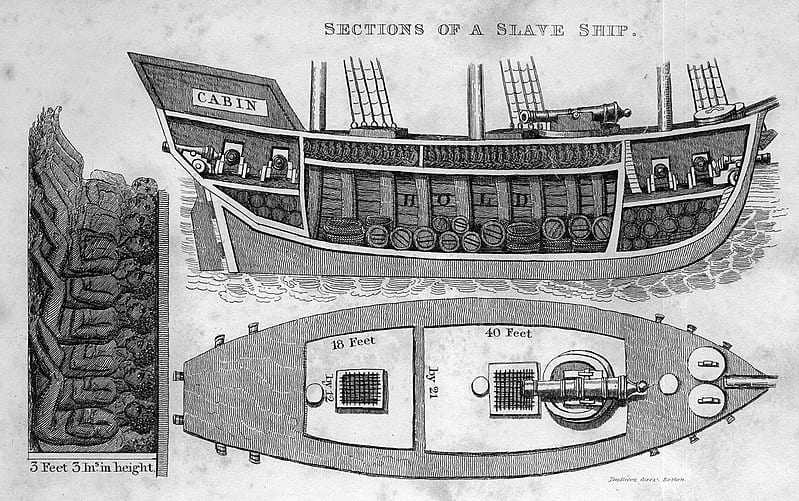







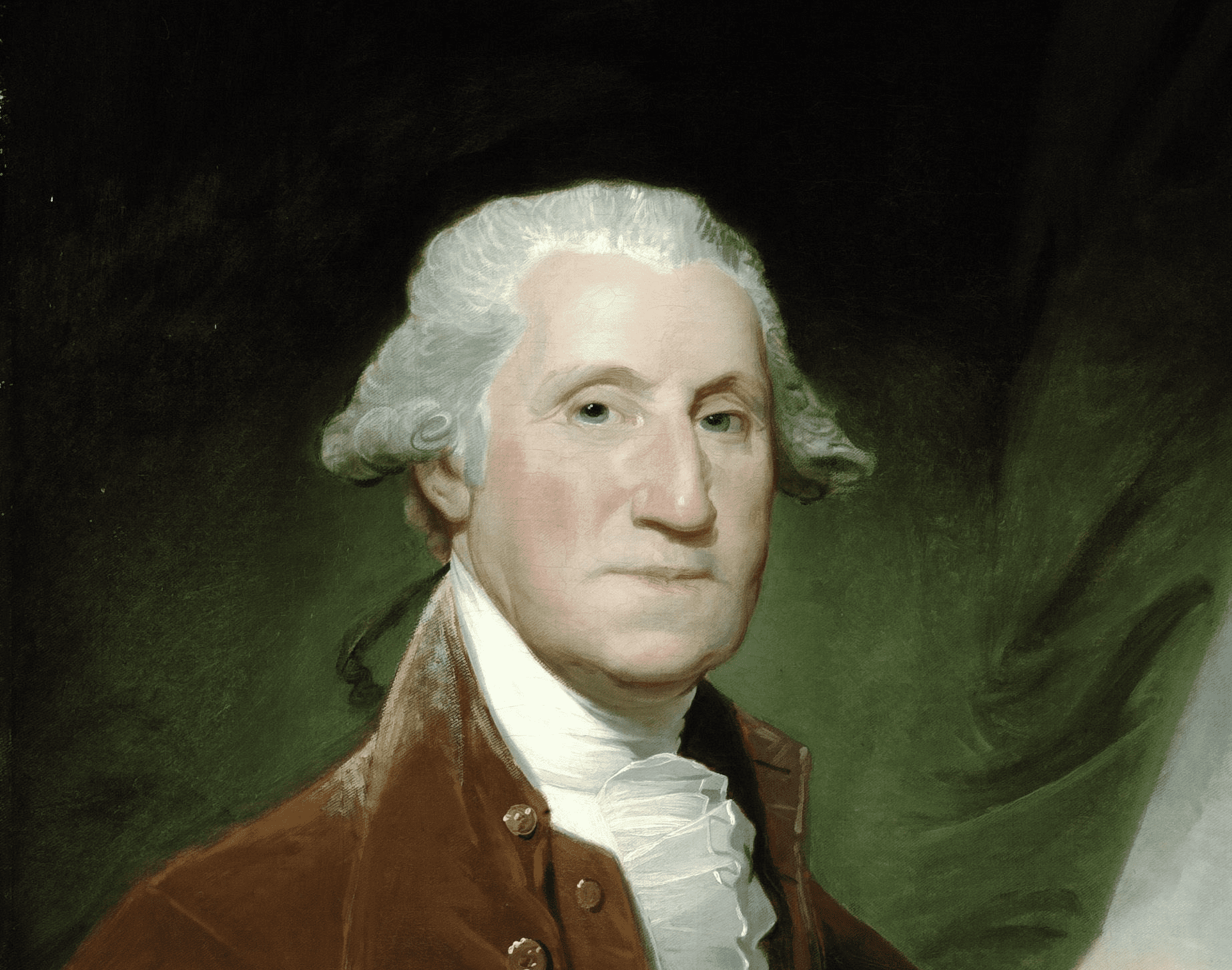



















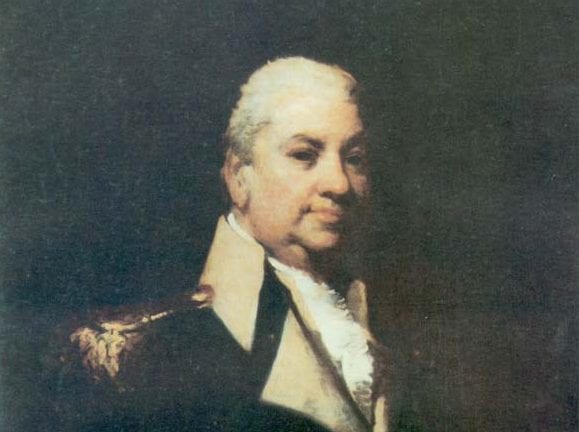



















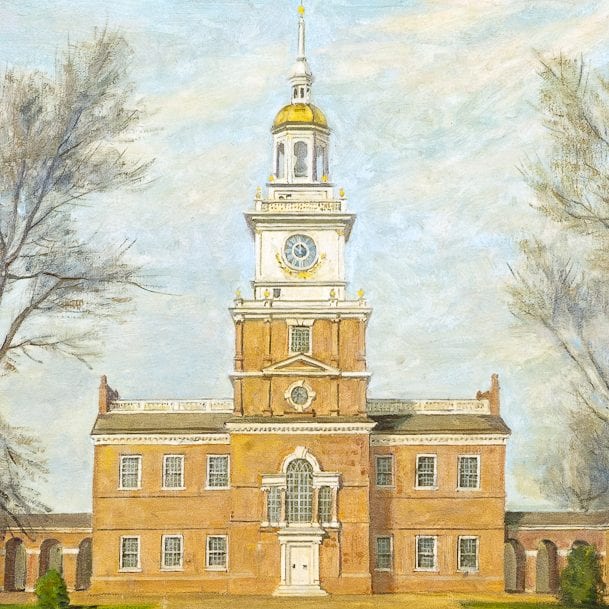

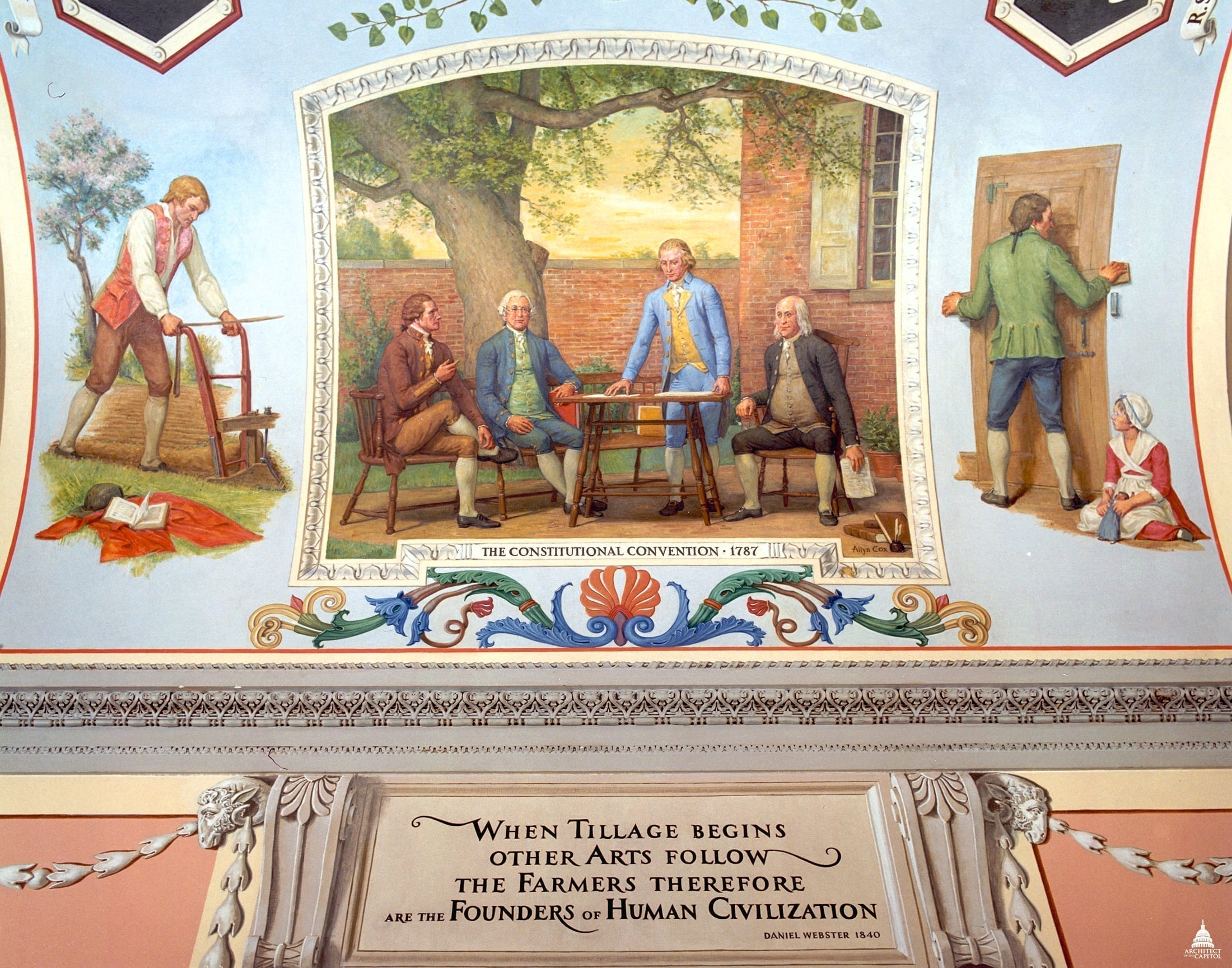

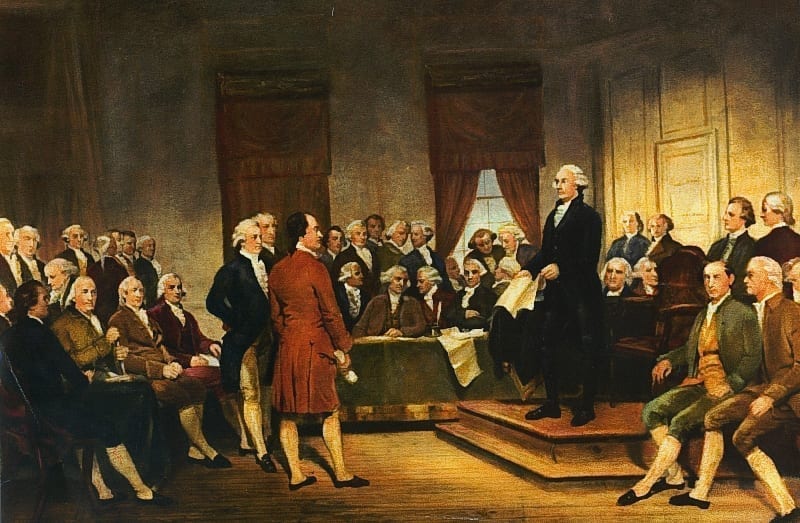



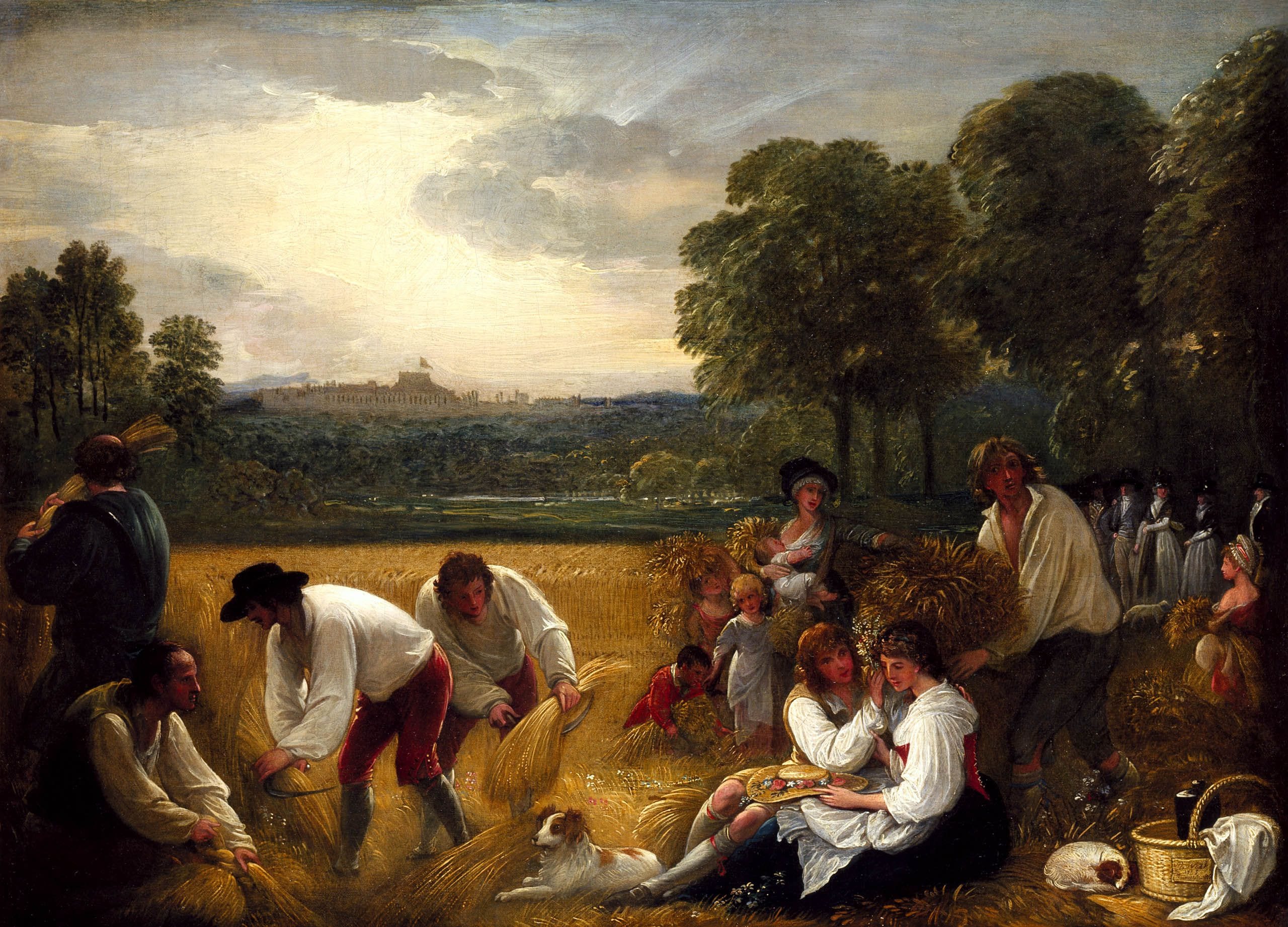
















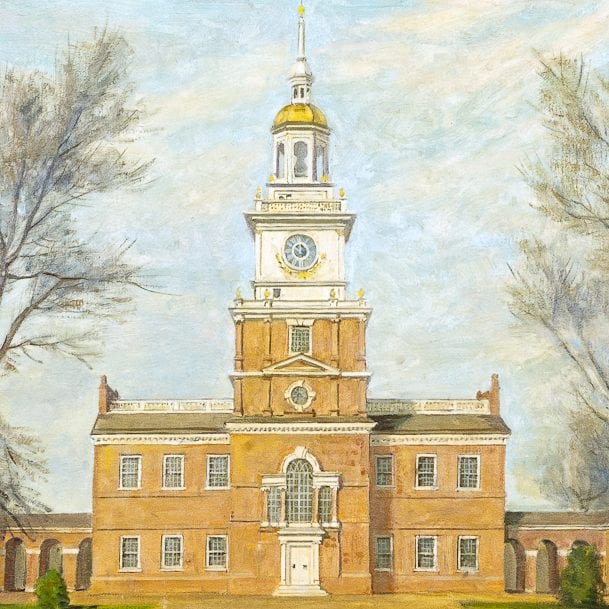
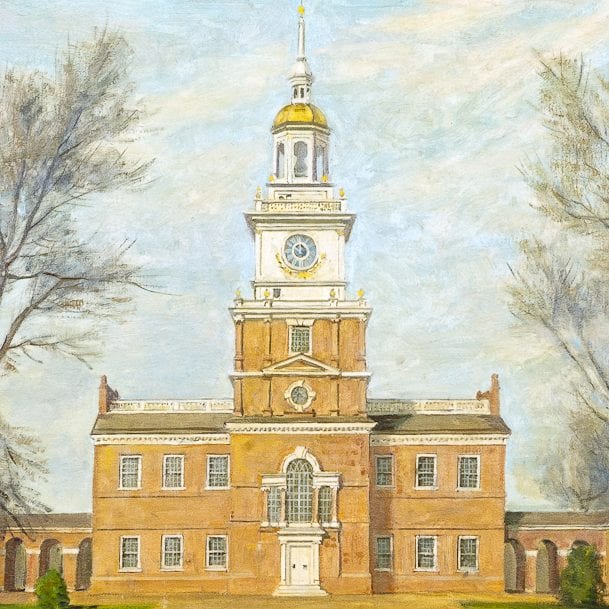


































































































![Finley, A. (1829) Pennsylvania. Philada. [Map] Retrieved from the Library of Congress, https://www.loc.gov/item/98688548/.](/content/uploads/2024/02/Map-of-PA--273x190.jpg)























































































































